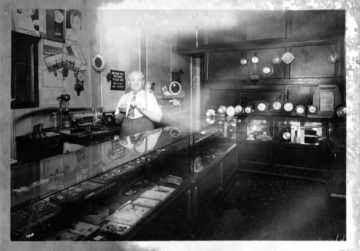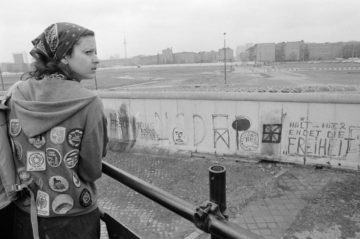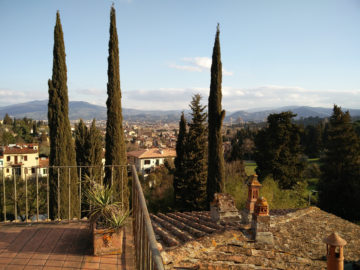by Barbara Fischkin

In 1919, after a brutal anti-Semitic pogrom in a small Eastern European shtetl, my grandfather knew that his wife and three young children would be better off as refugees. He prepared them to trek by foot and in horse-drawn carts from Ukraine to the English Channel and eventually to a Scottish port. Finally they sailed in steerage class to the United States. My grandfather was a simple watchmaker—and one of the visionaries of his time. Europe, he told his tearful wife, was not finished with murdering Jews, adding that things were likely to get much worse. And so, my grandmother became a hero, too. She said farewell to her mother and sister, knowing she would never see them again. In Scotland, she descended to the lower level of a ship with her children—my mother, the eldest, was seven years old. My grandmother traveled alone with her children. My grandfather was refused entry to the ship. He had lice in his hair. He arrived in the United States weeks, or possibly months, later.
My grandfather, Ayzie Zygal of Felshtin, Ukraine became Isaac Siegel of Brooklyn, New York, where he lived for the rest of his life. In his later years he spent summers in the Catskill Mountains, always asking to be let out of the family car a mile before reaching Hilltop House, a bungalow colony. My grandfather wanted to walk that last mile along the local creek. It reminded him of the River Felshtin. He never regretted coming to America.
My grandparents died, in Brooklyn in their early sixties. My grandfather had been poisoned by the radium he used on the paint brushes in his shop to make the hours glow. He licked them, with panache, to make them sharper. My grandmother had a heart condition, exacerbated by diabetes. They were both gone before I turned three.
They had lived much longer than they had expected they would in 1919.
I was told my grandfather left Europe to save his family’s life. And because my mother narrowly escaped death. I was told he did not believe there would be any more miracles. Read more »

 I moved to Berlin in 1984, but have rarely written about my experiences living in a foreign country; now that I think about it, it occurs to me that I lived here as though in exile those first few years, or rather as though I’d been banished, as though it hadn’t been my own free will to leave New York. It’s difficult to speak of the time before the Wall fell without falling into cliché—difficult to talk about the perception non-Germans had of the city, for decades, because in spite of the fascination Berlin inspired, it was steeped in the memory of industrialized murder and lingering fear and provoked a loathing that was, for some, quite visceral. Most of my earliest friends were foreigners, like myself; our fathers had served in World War II and were uncomfortable that their children had wound up in former enemy territory, but my Israeli and other Jewish friends had done the unthinkable: they’d moved to the land that had nearly extinguished them, learned to speak in the harsh consonants of the dreaded language, and betrayed their family and its unspeakable sufferings, or so their parents claimed. We were drawn to the stark reality of a walled-in, heavily guarded political enclave, long before the reunited German capital became an international magnet for start-ups and so-called creatives. We were the generation that had to justify itself for being here. It was hard not to be haunted by the city’s past, not to wonder how much of the human insanity that had taken place here was somehow imbedded in the soil—or if place is a thing entirely indifferent to us, the Earth entirely indifferent to the blood spilled on its battlegrounds.
I moved to Berlin in 1984, but have rarely written about my experiences living in a foreign country; now that I think about it, it occurs to me that I lived here as though in exile those first few years, or rather as though I’d been banished, as though it hadn’t been my own free will to leave New York. It’s difficult to speak of the time before the Wall fell without falling into cliché—difficult to talk about the perception non-Germans had of the city, for decades, because in spite of the fascination Berlin inspired, it was steeped in the memory of industrialized murder and lingering fear and provoked a loathing that was, for some, quite visceral. Most of my earliest friends were foreigners, like myself; our fathers had served in World War II and were uncomfortable that their children had wound up in former enemy territory, but my Israeli and other Jewish friends had done the unthinkable: they’d moved to the land that had nearly extinguished them, learned to speak in the harsh consonants of the dreaded language, and betrayed their family and its unspeakable sufferings, or so their parents claimed. We were drawn to the stark reality of a walled-in, heavily guarded political enclave, long before the reunited German capital became an international magnet for start-ups and so-called creatives. We were the generation that had to justify itself for being here. It was hard not to be haunted by the city’s past, not to wonder how much of the human insanity that had taken place here was somehow imbedded in the soil—or if place is a thing entirely indifferent to us, the Earth entirely indifferent to the blood spilled on its battlegrounds. 